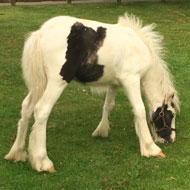Rise in the number of foals being abandoned

Olympus received round-the-clock care and is now three months old. Despite suffering an allergy to milk, he quickly adapted to eating special foal feed, grass and hay.
The low value of foals could be driving irresponsible and unscrupulous breeders to abandon them, The Blue Cross warned as it reported an unprecedented rise in the number of young foals coming through its doors.
Until this year, the charity had not seen any cases involving foals without their mothers; it is more common for them to take in pregnant mares or those that have recently foaled. Now, members of the public are phoning in to report potentially abandoned foals at a rate never seen before.
"We are concerned that the value of foals, particularly colts, is now so low that they are possibly being dumped and that this abhorrent trend is going to increase," said Jenna Martyn, rehoming manager at Blue Cross Burford.
"We are monitoring the situation and will consult with other charities about what further steps may need to be taken if numbers carry on growing."
Four foals have been taken into the charity's Burford centre in the past few weeks, one of which was just six weeks old and barely alive. Two other young foals in the same field sadly did not survive.
The surviving foal, named Olympus, received round-the-clock care and is now three months old. Despite suffering an allergy to milk, he quickly adapted to eating special foal feed, grass and hay.
Two colts, Gandalf and Frodo, are also doing well after being found wandering on the road. Bobbi, a bay filly of around seven months of age, is thought to have been abandoned because her plain brown colour was undesirable and made her worthless. She arrived at the charity with a respiratory infection but has made a good recovery.
The rising number of young animals needing care is putting a strain on charity resources, as they require a microchip, passport and vaccinations. They also need special foal feed and more handling and care than adults. Usually, foals are harder to rehome and therefore stay with the charity for longer. The Blue Cross is urgently seeking homes for the four foals at Burford. For more information, visit www.bluecross.org.uk



 The latest
The latest